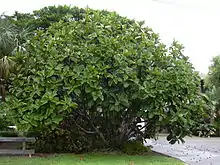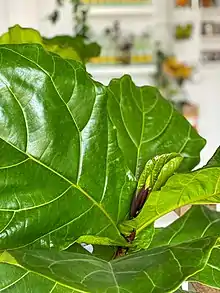Ficus lyrata
Ficus lyrata, commonly known as the fiddle-leaf fig, is a species of flowering plant in the mulberry and fig family Moraceae. It is native to western Africa, from Cameroon west to Sierra Leone, where it grows in lowland tropical rainforest. It can grow up to 12–15 m (39–49 ft) tall.
| Ficus lyrata | |
|---|---|
 | |
| Scientific classification | |
| Kingdom: | Plantae |
| Clade: | Tracheophytes |
| Clade: | Angiosperms |
| Clade: | Eudicots |
| Clade: | Rosids |
| Order: | Rosales |
| Family: | Moraceae |
| Genus: | Ficus |
| Subgenus: | F. subg. Urostigma |
| Species: | F. lyrata |
| Binomial name | |
| Ficus lyrata | |

The leaves are variable in shape, but often with a broad apex and narrow middle, resembling a lyre or fiddle; they are up to 45 cm (18 in) long and 30 cm (12 in) broad (though usually smaller) with a leathery texture, prominent veins and a wavy margin.
The fruit is a green fig 2.5–3 cm (1-¼ in) diameter.
Cultivation and garden uses
It is a popular ornamental tree in subtropical and tropical gardens, and is also grown as a houseplant in temperate areas, where it usually stays shorter and fails to flower or fruit. It requires indirect natural light.[1] It is hardy down to 10 °C (50 °F), so specimens may be placed outside during warm periods.[2]
This plant has gained the Royal Horticultural Society's Award of Garden Merit.[2][3]
Indoor use
A commonly tricky houseplant despite its popularity, the fiddle-leaf fig does not respond well to being moved, especially from a spot where it is thriving. Being a tropical plant, it does not tolerate cold temperatures well or survive prolonged freezes. Proper drainage, adequate sunlight (direct but not harsh), and misting with water will help keep a fiddle-leaf fig bright green with its signature glossy finish.[4]
Humidity and Temperature Requirements
The optimal relative humidity for the fiddle-leaf fig is between 25%-49%, but it can tolerate lower humidity. When it comes to the temperature requirements, the optimal temperature for the fiddle-leaf fig is between 65°F- 75°F (18°C- 24°C).[5]
Light Requirements
Grown indoors, light is the most limiting factor for Ficus lyrata. It is a full sun plant (it grows in direct sun most of the day in the natural habitat), but it can also grow well indoors in bright indirect light.
Propagation
Ficus lyrata can be propagated in multiple ways:
- By division
- By stem cuttings, and
- By air layering
See also
References
- Alix Martichoux (13 August 2019). "No matter where I go, I can't stop seeing this trendy plant in San Francisco". SF Gate.
- "Ficus lyrata AGM". Royal Horticultural Society. Retrieved 4 July 2020.
- "AGM Plants - Ornamental" (PDF). Royal Horticultural Society. July 2017. p. 39. Retrieved 27 February 2018.
- Kurutz, Steven (April 30, 2016). "The 'IT' plant of the times; Designers love the fiddle-leaf fig for its Dr. Seuss feel while others just say it makes a statement". National post (Toronto).
- "Growing Indoor Plants with Success". extension.uga.edu. Retrieved 2022-10-01.
External links
- Figweb: Ficus lyrata
- Care
- Ficus Lyrata benefits
- All about how to fertilize Ficus lyrata
- Huxley, A., ed. (1992). New RHS Dictionary of Gardening. Macmillan.
- Dressler, S.; Schmidt, M. & Zizka, G. (2014). "Ficus lyrata". African plants – a Photo Guide. Frankfurt/Main: Forschungsinstitut Senckenberg.
